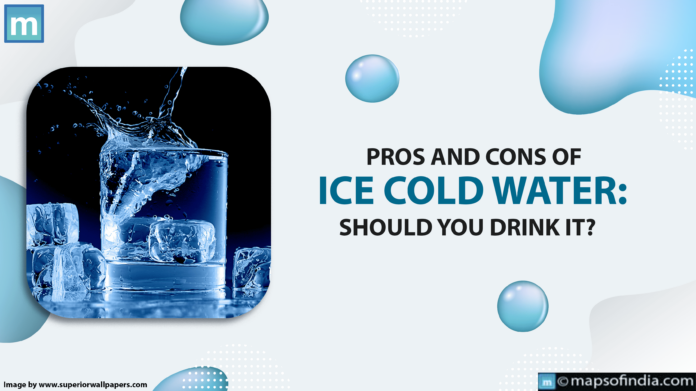Only a few things are more relaxing in the summer heat or after a long workout than a large glass of ice-cold water. The feeling of ice liquid sliding down your throat can be extremely gratifying, but is there more to it than just refreshment? Let’s look at the advantages and disadvantages of drinking iced water.
Pros of Ice Cold Water
-
Instant Refreshment
Ice-cold water’s most evident advantage is its ability to cool you off immediately. When you feel warm or tired, a few sips of cool water can instantly refresh your body and mind.
-
Improved Hydration
When the weather is chilly, many people drink more water. If you struggle to stay hydrated throughout the day, switching to ice-cold water may encourage you to drink more fluids, keeping you hydrated and improving your overall health.
-
Post-Exercise Recovery
Following a strenuous workout, your body temperature rises, and your muscles may tire. Drinking ice-cold water will help lower your core temperature and relieve muscle discomfort, resulting in a faster recovery.
-
Metabolism Boost
According to specific research, drinking ice-cold water may modestly enhance metabolic rate. While the effect is minor, it helps to maintain a healthy weight and support your body’s natural functioning.
-
Enhanced Mental Alertness
Cold water stimulates the neurological system, aiding cognitive function and mental clarity. A glass of ice-cold water could help sharpen your thinking if you’re feeling sluggish or unfocused.
Cons of Iced Cold Water
-
Shock to the System
Drinking cold water can occasionally shock your system, especially if you are not used to it. This abrupt temperature change can cause pain, particularly in the throat and stomach, and may even result in headaches in sensitive individuals.
-
Temporary Dehydration
Although ice-cold water is delightful, extreme cold temperatures can cause blood vessels to contract. This restriction may reduce blood supply to essential organs, resulting in temporary dehydration as your body redirects fluids to maintain core temperature.
-
Digestive Discomfort
Cold water can slow digestion, especially if drunk during or after meals. Chilled liquids can freeze fats in the digestive tract, making them more challenging to digest and perhaps causing indigestion or bloating.
-
Potential Tooth Sensitivity
Prolonged contact with ice-cold water may worsen tooth sensitivity, especially in people with dental concerns. Extreme temperatures can cause discomfort or agony in the teeth and gums, particularly if enamel has eroded.
Constriction of airways
Drinking ice-cold water can temporarily narrow the airways, making breathing harder, especially for those with asthma or other respiratory disorders. This restriction is usually temporary and dissolves fast, but it can be not very pleasant for people who feel it.
Ultimately, ice-cold water provides immediate refreshment, improving hydration, metabolism, and mental alertness. However, being aware of potential side effects such as stomach discomfort, teeth sensitivity, and temporary dehydration is essential. As with most things, moderation is key. Enjoy ice-cold water in moderation, especially if you’re sensitive to severe temperatures, and pay attention to your body’s cues to stay hydrated and comfortable.




